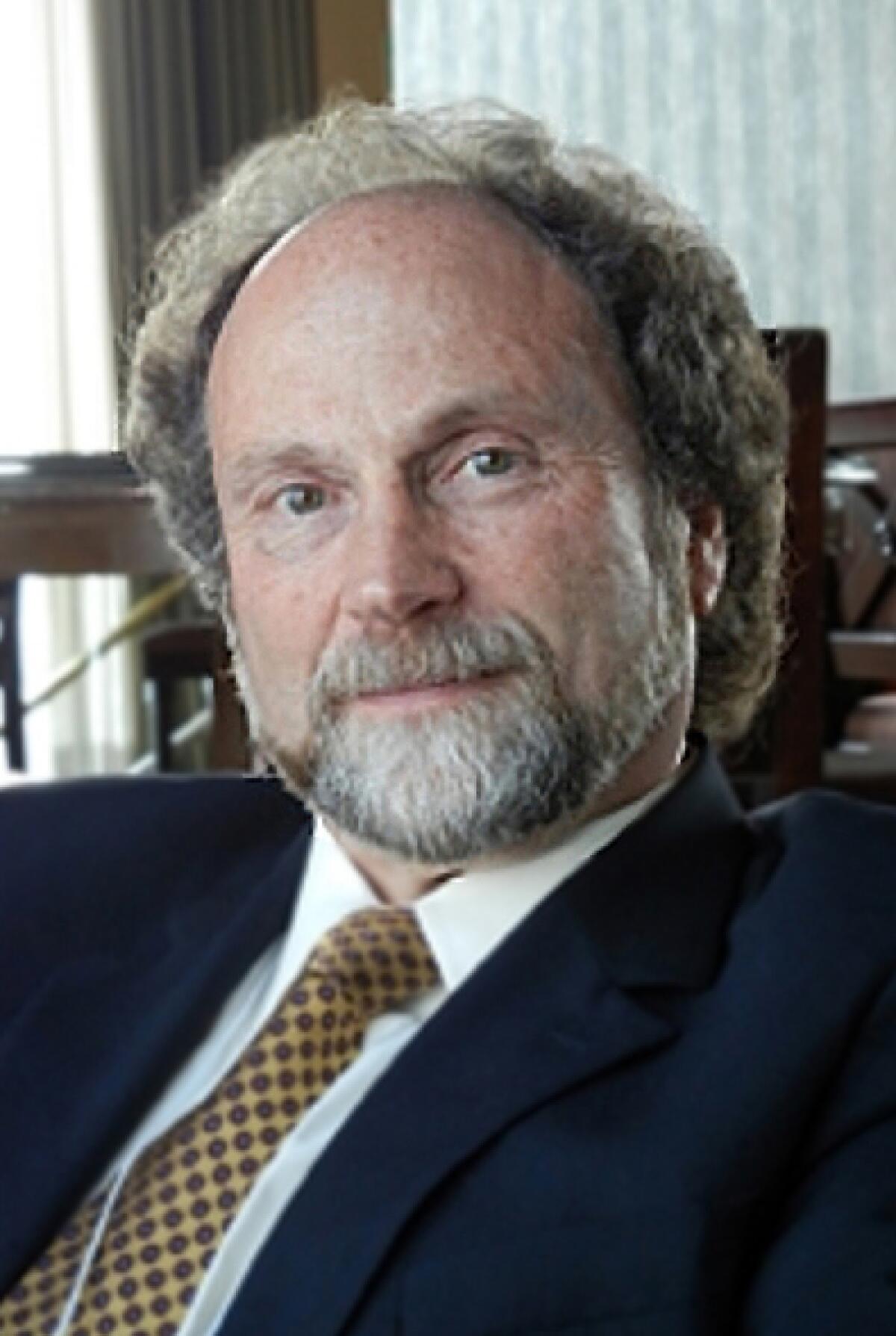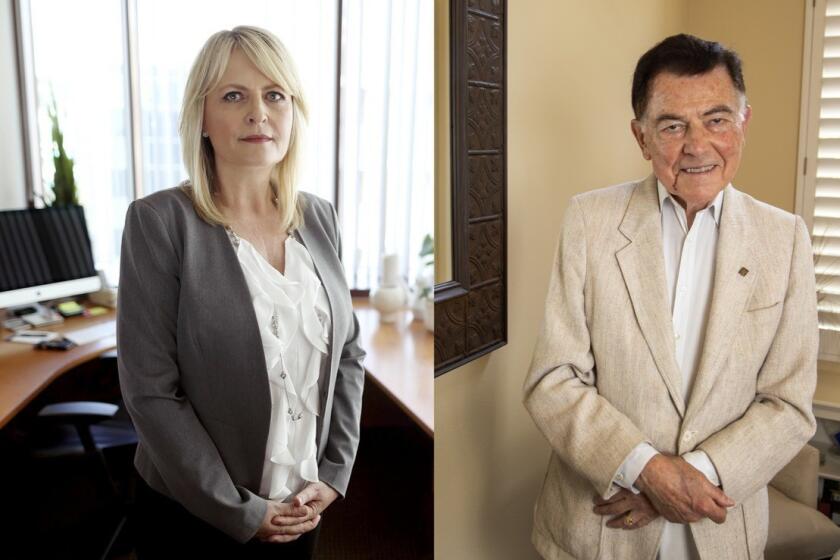A UCI professor was accused of sexual harassment. He’s back in the lab

- Share via
UC Irvine professor Bruce Blumberg sat down at a quiet cafe and began composing a message.
He’d arrived in Spain a few days ahead of an international conference, along with a graduate student he’d invited to participate.
He texted the student saying he’d found a spot to dine with no tourists.
Instead of joining him, the young woman hurried to her hotel to pack, “fleeing” from the man she said had spent four days bombarding her with sexual remarks and innuendo, according to a 129-page university investigation reviewed by The Times.
The student, who was not identified in the report and whom The Times is not naming, told a UCI investigator after abruptly returning to Irvine in May 2022 that she had been uncomfortable with the idea of being alone with Blumberg and brought someone else along on the trip.
Documents provided by Blumberg’s spokesperson identified the student’s travel companion as her sister.
The trip, the student said, was “an absolute nightmare”; she had been bracing for him to “make a move” at the conference. Blumberg had called her “babe,” she told the UCI investigator, and refused to leave another cafe until she’d posted photos of them on Instagram. She said he urged her to visit a sex shop, told her he had been with 200 women before he was married and made constant sexual comments — including lewdly remarking, “I could give you some meat,” when they were discussing a charcuterie platter, according to the university report.
The sister, who said she’d never met Blumberg before the trip, told a UCI investigator that she was disgusted by the professor’s remarks. Her sister was “pale as a ghost” by the end, she said.
Shortly after Blumberg returned to campus from the Spain trip, UC Irvine officials launched an investigation. He has denied any wrongdoing, saying he has always acted professionally and never made any inappropriate remarks.

The investigation was not the first to examine Blumberg’s behavior with students. Since 2010, officials have met with him at least four times, according to the report obtained by The Times.
The report notes “multiple interventions,” including a 2010 meeting with his department chair on an undisclosed topic, a 2013 “policy compliance meeting” after he was alleged to be in a consensual relationship with a student, a formal investigation in 2019 after a student accused him of sexual harassment and another “policy compliance meeting” in 2022 around “language use.”
Blumberg challenged the integrity of the investigation into the trip to Spain, noting that joint interviews were conducted with the grad student and her sister, which he said was against university policy. He also disputed many of the student’s claims, including that she was forced to sit next to him on the flight. The UCI report noted there was “inconsistency” around the student’s statements about travel planning, but that overall the investigator believed she was credible.
Blumberg did not accept requests for an interview. He denied through a spokesperson that he had ever acted inappropriately and said the university investigator took the word of a few students who were trying to retaliate for poor performance in the lab.
“A small subset of former lab members who were disgruntled and unsatisfied with their lackluster achievements, as compared with other higher achievers, sought to blame their failures on a purported toxic lab atmosphere, when in fact it was a demanding, yet rewarding place to work,” the spokesperson said in an emailed statement.
Hundreds of students have worked with Blumberg since he joined the university in 1998.
Some say he was a caring mentor who remembered birthdays and helped get research papers published.
“From my interactions with Dr. Blumberg, he is very supportive of female scientists and junior members as well,” said associate biology professor Sha Sun, who said Blumberg is her senior mentor.
But others said they saw a different side.
Denise Stephen said she’d noticed a pattern of people leaving his lab prematurely “and often on bad terms” when she was a graduate student around 2008. She said she was shocked when she was contacted during the 2022 investigation.
“When is this going to end?” Stephen said she remembered thinking.
UCI scientist Felix Grun started in Blumberg’s lab as a postdoc in 1999 and alleged a toxic work environment that was “emotionally exhausting,” calling it “a nonstop stream of verbal abuse and emotional abuse.”
Grun had previously filed a complaint against Blumberg after he felt he was unjustly denied credit in a scientific paper. The school found Blumberg had not erred in denying him a byline.
A UC Irvine employee has filed a lawsuit against the Board of Regents and a volunteer at the university’s medical center who she said sexually harassed and assaulted her for at least a year.
Blumberg was alleged to have been in a “romantic” relationship starting about a decade ago with a postdoc student, according to the UCI investigation and interviews with former students.
University reports show officials met with Blumberg at least twice about the allegations, which his spokesperson called “unsubstantiated gossip.”
Years later, in 2019, Blumberg was investigated after accusations that he sexually harassed an undergraduate, according to the investigation. According to the UCI probe, investigators found that while he had not violated school policy, Blumberg’s interactions with students included sexual comments, discussing their Instagram posts, applying CBD oil and drinking.
This conduct, they said, “could reasonably be seen as unprofessional.”
Three years later, university officials were alerted to Blumberg’s trip to Spain.
After interviewing more than 30 people, UCI investigators determined in April 2023 that Blumberg had violated university policy against sexual harassment during the trip and “created a hostile academic and work environment” over the years.
The vice provost for academic personnel at the time, Diane O’Dowd, placed Blumberg on involuntary leave with pay in July 2023 while UCI considered disciplinary charges.
But Chancellor Howard Gillman overruled O’Dowd’s decision and overturned the leave that September. The university said in a statement to The Times that the chancellor did not believe Blumberg’s behavior put those on campus at risk of “immediate and serious harm” — the threshold for placing someone on leave. According to University of California rules, a faculty member can be placed on involuntary leave only if there is a “strong risk” to those at the university or if the conduct is under investigation by law enforcement.
In December, Blumberg and UCI reached an agreement. According to documents obtained from the university through a public records request, Blumberg accepted a three-month suspension without pay in exchange for the dismissal of any disciplinary charges against him.
Despite that agreement, Blumberg maintains that he behaved appropriately in Spain.
“As has been attested to by multiple current and former lab members, Professor Blumberg has always been extremely supportive of his lab members and strives to support their career success,” said his spokesperson, who included more than 30 letters written by former students supporting Blumberg.
The university agreement spelled out a number of stipulations that Blumberg would be required to meet when he returned to campus, including two hours of sexual harassment training. In addition, he no longer would be allowed to have high schoolers in his lab.
Permission would be required for lab members to attend conferences with him, and he would not be allowed to drink alcohol at lab functions. He could not follow students on social media or discuss his personal life with them, and he was not to ask about theirs.
Department Chair Kavita Arora also would meet regularly with students to “provide them with a specific space to raise any concerns” about Blumberg, UCI said in a statement.
For years, the professor told the assistant dean that she was beautiful and greeted her with hugs and a kiss on each cheek.
Six years ago, another case of sexual harassment at UCI’s Charlie Dunlop School of Biological Sciences ended with the resignation of a top professor. In 2018, famed geneticist Francisco J. Ayala stepped down after a university investigation found he had sexually harassed four women. His name was also removed from the School of Biological Sciences, which had been dedicated in 2011 after Ayala donated $10 million.
The women — who included faculty members and grad school students — criticized UCI for its sluggish response to their complaints.
Biology professor Jessica Pratt was the first at UCI to formally report Ayala in 2015. She said it took three other women publicly coming forward with accusations of inappropriate and sexist remarks before UCI disciplined him.
Since Ayala resigned, UCI has brought back a program to prevent sexual harassment and created an office to support faculty members who have complaints about colleagues’ behavior.
“The university continues to monitor all whistleblower or sexual violence/sexual harassment reporting portals specifically for anything related to Dr. Blumberg or his lab,” UCI officials said in a statement to The Times in June.
Some students and faculty say the changes are inadequate. Despite pledging to review the school’s sexual harassment policy following Ayala’s resignation, Pratt said, the university still often deals with complaints by putting physical distance between those involved in any accusations — for example, having them move offices.
The process, generally speaking, doesn’t go far enough to solve the problem, Pratt said. “That’s why these things persist for much longer than we would imagine,” she said.
Blumberg was back on the job in March. In a statement provided by his spokesperson, Blumberg emphasized that there have been no new accusations since then and that all lab members chose to work in the lab after being made aware of the past complaints.
He begins his 27th year at UCI this week.
More to Read
Sign up for This Evening's Big Stories
Catch up on the day with the 7 biggest L.A. Times stories in your inbox every weekday evening.
You may occasionally receive promotional content from the Los Angeles Times.













